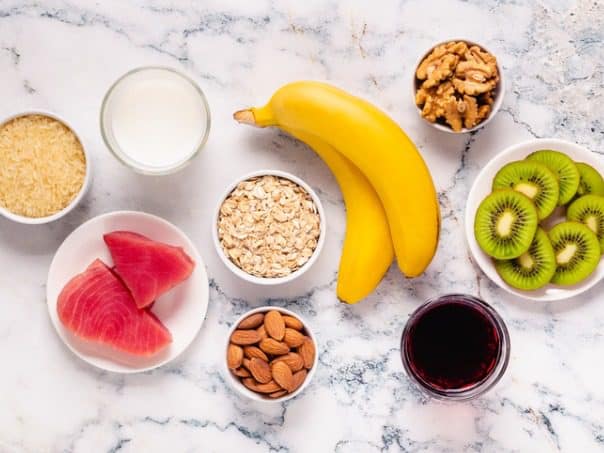
What Foods Help You Sleep? Discover the Best Foods for a Good Night’s Sleep
admin
- 0
- 7
Foods Help You Sleep have to containing magnesium, such as almonds and bananas, and those rich in tryptophan, like turkey and milk, can promote sleep. Cherries and kiwi are also known for their sleep-inducing properties due to their high melatonin content.
Achieving a good night’s sleep can often hinge on the dietary choices we make throughout the day. Selecting the right foods before bedtime can be the key to drifting off into a soothing, restful slumber. This is because certain foods have the power to stabilize blood sugar, calm the brain, and regulate your sleep-wake cycle, which are critical factors in how well you sleep.
By integrating these sleep-friendly foods into your diet, not only do you set the stage for a tranquil night, but you also support overall health and well-being. Prioritize these natural sleep aids and you might find yourself waving goodbye to counting sheep.
Table of Contents
ToggleThe Link Between Diet And Sleep
Understanding the connection between what we eat and the quality of our sleep can be a game-changer for those struggling with restlessness or insomnia. Nutritional intake directly influences the circadian rhythm and can either promote restful slumber or lead to disruptive sleep patterns. This intricate relationship governs our overall well-being, as good sleep is a cornerstone of health.
Impact Of Food On Sleep Quality
Eating habits play a pivotal role in how well we sleep. Certain foods and beverages have the power to calm the mind and prepare the body for a night of deep sleep, while others can cause disturbances. Consuming big meals or specific types of food close to bedtime may lead to discomfort and restlessness. Let’s delve into how different nutrients and meal timings can either support or hinder our sleep quality.
- Tryptophan-rich foods: Foods high in the amino acid tryptophan can promote sleep. Tryptophan is a precursor to serotonin, a neurotransmitter that gets converted into melatonin, the sleep hormone. Turkey, nuts, and seeds are excellent examples.
- Complex carbohydrates: Whole grains and vegetables with complex carbohydrates can aid in enhancing sleep quality by supporting steady blood sugar levels throughout the night.
- Magnesium-rich foods: Magnesium is a natural relaxant. Foods like dark leafy greens, almonds, and legumes contain significant amounts of this nutrient, which can help improve sleep.
- Herbal teas: A warm cup of herbal tea like chamomile or valerian root can serve as a nighttime tradition that relaxes the body and signals that it’s time to wind down.
On the flip side, caffeinated drinks, sugary snacks, and heavy, rich meals can disrupt sleep patterns. It’s best to avoid these, especially later in the day.
| Beneficial Nutrient | Food Sources | Effect on Sleep |
|---|---|---|
| Tryptophan | Turkey, Nuts, Seeds | Increases melatonin production, aiding in sleep onset |
| Complex Carbohydrates | Whole grains, Vegetables | Stabilizes blood sugar, supporting uninterrupted sleep |
| Magnesium | Dark leafy greens, Almonds, Legumes | Acts as a muscle relaxant, improving sleep quality |
| Herbal Ingredients | Chamomile, Valerian root teas | Provides a calming effect, promoting relaxation and sleep preparedness |
Meal timing also significantly impacts sleep. Large meals shortly before bedtime can lead to indigestion and discomfort. A light snack an hour before bed, however, may help in inducing sleep, especially when it includes sleep-promoting nutrients.
Note: Individual responses to dietary choices can vary. It’s essential to observe how specific foods affect your own sleep patterns and adjust accordingly.
Essential Nutrients For Better Sleep
Struggling to get a good night’s sleep? It’s not just about counting sheep; your diet plays a crucial role, too. Certain nutrients can be essential players in the game of slumber, acting as natural sleep aids that support your body’s sleep-wake cycle and promoting a restful night. Let’s dive into the essential nutrients that can escort you into the land of nod and ensure that your body is well-prepped for high-quality sleep.
Role Of Magnesium
Magnesium is a powerhouse mineral when it comes to facilitating relaxation and sleep. It regulates neurotransmitters that are responsible for sending signals throughout the nervous system and controls the hormone melatonin, which guides your sleep-wake cycles. Consuming magnesium-rich foods such as spinach, almonds, bananas, and whole grains can help to ease your body into a peaceful slumber.
Benefits Of Vitamin B6
This essential vitamin is vital for the production of serotonin, a neurotransmitter that dictates mood and sleep patterns. A deficiency in Vitamin B6 can disrupt your sleep and even lead to insomnia. Foods like chickpeas, salmon, and avocados are excellent sources of B6 and could be valuable additions to your dinner plate for enhancing sleep quality.
Tryptophan
Tryptophan is an amino acid that the body converts into serotonin, which is then modified into melatonin. Indulging in tryptophan-rich foods such as turkey, chicken, eggs, and milk before bedtime may naturally prompt sleepiness and help modulate your sleep cycle.
- Milk contains a duo of sleep-promoting substances: tryptophan and calcium. The latter assists the brain in utilizing tryptophan for the production of melatonin.
- Eggs, often touted as a breakfast staple, can also double up as a sleep enhancer due to their high tryptophan content.
- Poultry, such as turkey and chicken, has a reputation for inducing drowsiness after consumption, predominantly due to tryptophan.
| Food | Nutrient | Benefit for Sleep |
|---|---|---|
| Almonds | Magnesium | Regulates neurotransmitters and melatonin |
| Salmon | Vitamin B6 | Supports production of serotonin |
| Milk | Calcium, Tryptophan | Aids in the creation of melatonin |
Incorporating these foods rich in magnesium, vitamin B6, and tryptophan into your meals can assist in synchronizing your internal clock and fostering a routine conducive to sleep. Keep this nocturnal nutrition tip in mind, and your pursuit of peaceful slumber may just become a dream come true.
Best Foods For Improving Sleep
A good night’s sleep is foundational to overall health, and while various factors influence sleep quality, diet cannot be overlooked. Some foods have sleep-promoting properties that can assist you in drifting off faster and enjoying a more restful slumber. Here, we uncover the top nourishing choices that can naturally enhance your sleep, because yes, the road to dreamland is paved with more than just comfy pillows and a dark room.
Incorporating Cherries
Incorporating Cherries
Cherries are not only delicious but also a natural source of melatonin, the hormone that helps regulate sleep cycles. Including cherries in your diet could be a delightful way to encourage better sleep. Whether it’s through a handful of fresh cherries, a glass of cherry juice, or a serving of dried cherries, adding this fruit to your evening routine may help you clock in those coveted ZZZs.
Nuts and Seeds for Sleep Enhancement
Nuts And Seeds For Sleep Enhancement
- Almonds are rich in magnesium, a mineral known for its sleep-promoting effects.
- Walnuts also contain melatonin, which can help signal to your body that it’s time to wind down.
- Pumpkin seeds are another sleep-friendly snack, boasting a good amount of zinc and magnesium.
Incorporate a mix of these nuts and seeds into your diet to aid with sleep. A small nighttime snack could very well be the nudge your body needs toward a night of restful sleep.
The Power of Herbal Teas and Warm Milk
The Power Of Herbal Teas And Warm Milk
Drinking herbal teas like chamomile or valerian root in the evening can offer a calming effect on the brain, promoting sleepiness. The soothing ritual of sipping on a warm beverage before bed can also help signal to your body that it’s time to relax. On the other hand, warm milk has long been a traditional remedy for insomnia. It contains tryptophan, an amino acid that can help in the production of sleep-regulating serotonin and melatonin. Whether it’s a psychological comfort or the nutrients within, a warm cup might be just what your sleep routine is missing.
Food And Sleep Schedule
Understanding the relationship between what we eat and how we sleep is a key component of holistic well-being. Just as certain foods have the power to energize us for the day ahead, there are also foods that can promote a restful night’s sleep. But it’s not just about what you eat; it’s also about when you eat. Aligning your food intake with your sleep schedule can greatly enhance the quality of your slumber. Let’s explore how the timing and frequency of your meals influence your nightly rest.
Timing And Frequency Of Meals
The body’s internal clock, or circadian rhythm, dictates our sleep-wake cycle and is also tied to our eating habits. Disrupting this clock with erratic meal times can lead to sleep disturbances. Conversely, consistent meal times can support a healthier sleep pattern. Here are some guidelines to consider:
- Maintaining regular meal times helps regulate your body’s clock.
- Avoiding heavy meals 2-3 hours before bedtime can prevent sleep disruptions from digestion.
- Include a balanced dinner with an emphasis on sleep-promoting nutrients, like magnesium and tryptophan.
It’s not just about dinner; what you consume throughout the day matters too. A nutrient-rich breakfast jumpstarts your metabolism and aligns your energy levels with the daytime. As the day progresses, gradually decreasing your calorie intake can prepare your body for rest.
For those who experience hunger pangs before bedtime, consider a light snack that’s high in complex carbohydrates and protein. This combination can assist in the production of sleep-inducing brain chemicals. Examples include:
| Snack Type | Foods |
|---|---|
| Complex Carbohydrates | Oatmeal, popcorn, whole-grain crackers |
| Protein | Nuts, cheese, Greek yogurt |
Determining the optimal frequency of meals is also essential. Some individuals find success with three square meals, while others benefit from smaller, more frequent meals. Listen to your body and adjust accordingly,
Creating Your Sleep-friendly Diet Plan
Creating Your Sleep-Friendly Diet Plan can be a transformative step towards improving your sleep quality and overall health. What you consume throughout the day can have a significant impact on how quickly you fall asleep and how well you rest. With a few tweaks to your eating habits, finding those coveted hours of blissful slumber might be easier than you think. Let’s dive into how meal planning and bedtime snacks can set the stage for a restful night’s sleep.
Meal Planning For Better Sleep
Nutrition plays a crucial role in regulating our sleep patterns. To harness the power of food to support better sleep, consider the following tips:
- Focus on Complex Carbohydrates: Include whole grains such as oatmeal, barley, and brown rice in your dinner. They help increase the availability of tryptophan in the brain, which then converts to serotonin—a relaxation-inducing neurotransmitter.
- Choose Lean Proteins: Consuming lean proteins like turkey, chicken, and fish—rich in tryptophan—promotes sleepiness. Avoid heavy red meats and fried foods as they take longer to digest and can disrupt sleep.
- Include Sleep-Inducing Nutrients: Foods high in magnesium, calcium, and vitamin B6 can help the body produce melatonin, the sleep hormone. Almonds, spinach, yogurt, and bananas are great choices.
Plan your dinners to be well-balanced, and avoid overeating by keeping portions reasonable. A heavy stomach can lead to discomfort and restlessness, impeding your ability to fall asleep.
Incorporating Healthy Snacks Before Bedtime
A small, well-timed snack can sometimes be the key to drifting off without a hitch. Here’s how to choose the best bedtime snacks:
- Select Snooze-Friendly Snacks: A combination of carbohydrates and protein can give you a boost of serotonin. Good options are a slice of whole-grain bread with almond butter or a small bowl of cereal with milk.
- Limit Sugar and Caffeine: Keep sugar and caffeine out of your pre-sleep snacking to prevent a surge in energy when you’re trying to wind down. Foods like chocolate can contain surprising amounts of caffeine.
- Avoid Spicy or Acidic Foods: These can cause heartburn or stomach trouble at night, so steer clear of them before bed to secure uninterrupted sleep.
Time your snack for about an hour before you plan to turn in to give your body enough time to process it, leading to that perfect level of satiety conducive for catching Z’s.

Credit: www.nectarsleep.com
Frequently Asked Questions On What Foods Help You Sleep?
Which Foods Are Best For Better Sleep?
Foods rich in tryptophan, such as turkey and milk, may improve sleep. Almonds and walnuts contain melatonin. Cherries, particularly tart cherries, are another good choice, as they naturally have melatonin. Complex carbohydrates like oatmeal or whole-grain bread can also help.
Can Bananas Help You Sleep At Night?
Yes, bananas can aid in sleep due to their magnesium and potassium content, which help relax muscles. They also contain tryptophan, which is converted into serotonin and melatonin, the brain’s key calming hormones.
Are There Any Drinks That Promote Sleep?
Warm milk, chamomile tea, and tart cherry juice are known for their sleep-inducing properties. These beverages have compounds that help regulate sleep cycles and induce relaxation, making them perfect before bedtime.
How Do Fatty Fish Improve Sleep Quality?
Fatty fish, such as salmon and mackerel, are high in omega-3 fatty acids and vitamin D, both of which have been linked to increased production of serotonin. This improves sleep by regulating the sleep-wake cycle.
Conclusion
Embracing a diet rich in sleep-promoting foods can transform your rest patterns. Cherries, almonds, and turkey are just a few options to consider. Prioritize these nutrient-dense snacks for a night of deeper, more rejuvenating slumber. Your body and mind will thank you for the healthy choices supporting better sleep.
Sweet dreams await with every mindful bite.



